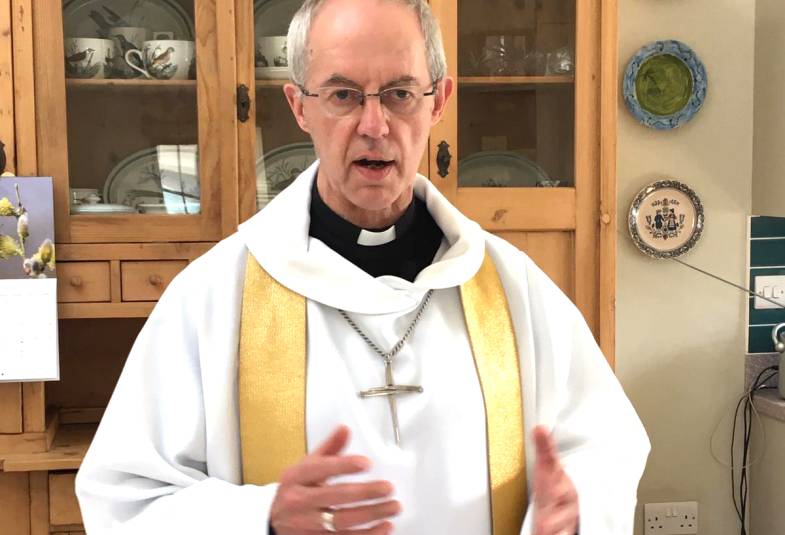The sermon, which was delivered from the kitchen of the Archbishop’s flat in London, was part of the Church of England’s first national digital service for Easter Sunday. It was recorded on the Archbishop’s iPad.

Jeremiah 31:1-6, Acts 10:34-43, John 20: 1-18
In 1944 a British soldier, in the Normandy campaign was asked by a friend what he would do after the war. He had been an architect in peacetime and his answer was that he would build a Cathedral.
His name was Basil Spence, and his friends must have thought he was mad, for only one cathedral had been completed in England since St Paul’s in London 350 years earlier.
In 1950 Spence, fired with hopeful inspiration and ambition, won the competition to design Coventry Cathedral, one of the greatest of the post war symbols of peace and reconciliation. It was completed in 1962.
Imagination, ambition, hope, are some of the foods that nourish our minds in dark times. They can be mere escapism, or they can give us a settled direction and intention.
That sense of a new direction and intention, of hope that carries us forward, is likely to be mocked by many.
Cynicism tells us that all will go on as before. Despair tells us that the road is coming to an end. Fear tells us to look after ourselves.
Imaginative hope gives us a level-headed courage and a grand ambition when it is based on what we know to be true.
Neither the women nor the two disciples had hope when they went to the tomb. Mary was so filled with sorrow, so caught by an utterly reasonable despair that she could not even recognise Jesus when he stood in front of her.
Who would recognise someone known to be dead?
Yet within a very short period we find Mary announcing that she has seen the Lord. Not long after Peter is telling Cornelius that Jesus had risen and that this was the foundation of hope for all people.
There are three astonishing things in what Peter says.
First, that someone could rise from the dead. Peter’s change from frightened denier of Christ to bold advocate is one of the great evidences for the resurrection.
Second, that God would reach in love to the whole world.
Third, that Roman occupier and Jewish occupied could be drawn together in unity.
To this day the resurrection of Jesus is the solid foundation of all hopes for a better world. The first Christians found that God had made new life possible and offered it to us.
In Christ Jesus, the first Christians were empowered with the resources to live in ways that brought abundant life to rich and poor, strong and weak, the privileged and the rejected.
An amazing community grew and loved and served in time of peace and war, of health and of great epidemics. This is the same community, the global church, that still lives and grows all over the world.
The resurrection changes not just us individually, but is the fuel for hope-filled ambition and for imagination that builds dreams into reality. The key Christian distinctive is hope.
Which brings us to today, Easter Day 2020. Who does not feel the shock of the last weeks?
So many have suffered from the virus, been in hospital, or mourn someone who is gone. We were probably shocked as the Prime Minister went into intensive care. We pray for him and his family especially today.
So many people right across the country are anxious about employment, food, are isolated from loved ones and feel that the future looks dark.
People right across the Globe feel the same uncertainty, fear, despair and isolation. But you are not alone.
The women went to the tomb in the dark, and there they found the light and hope of Christ risen from the dead. Mary Magdalene turned the disciples’ world back to light; that woman who, as a previous Archbishop of Canterbury, Lancelot Andrewes, said was “last at the cross, and first at the tomb.”
In the weeks and months that followed they had a new vision of justice, they shared their goods, they cared for each other so powerfully that over time the world changed, and changes to this day.
This was a vision of the Kingdom of God come on earth, where death would not be the end.
Which brings us back to ambitious imagination and unreasonable hope. In the resurrection of Jesus Christ, we have a hope that is surer than stone; than any architecture.
Even in the dark days of this Easter we can feed on hope. We can dream of what our country and our world will look like after the pandemic.
There will still be wickedness and war, poverty and persecution, greed and grasping. There always has been; always will be.
Yet in the resurrection of Jesus God lights a fire which calls us to justice, to live in humble generosity, to transform our societies.
After so much suffering, so much heroism from key workers and the NHS, so much effort, once this epidemic is conquered here and round the world, we cannot be content to go back to what was before as if all is normal.
There needs to be a resurrection of our common life, something that links to the old, but is different and more beautiful.
We must dream it because it is the gift of God. Then we must build it in partnership with God.
In the new life of the resurrection of Jesus, we dare to have faith in life before death. We hope, because of the resurrection.